Is Donald Trump Really As Vulnerable As He Appears?
Democrats and "Never Trump"ers shouldn't count their chickens before they're hatched.
In the wake of yesterday’s polling out of Wisconsin, Michigan, and Pennsylvania showing Donald Trump’s job approval numbers declining in the three states that handed him the Presidency, as well as other polling and evidence showing that he continues to be historically unpopular for a newly elected President, MSNBC’s Steve Kornacki cautions against accepting the notion that Trump cannot recover from his current position and that his Presidency is doomed:
Diagnosing the state of President Donald Trump’s political health should be a simple matter. The story that the traditional metrics tell is straightforward.
On a good day for him, Trump’s approval rating might crack 40 percent. But a more typical day lately will put him in the mid- to high-30s, while the worst day, so far, had him plunging to 33 percent. Since his inauguration, Trump’s approval in Gallup’s daily tracker has never exceeded 46 percent, and he only hit that number once — during his first week on the job.
By any historical standard, these numbers are politically catastrophic. And maybe that’s just what they are.
What complicates them, though, is how Trump became president in the first place.
Recall some of the dire polling he faced as a candidate. More than 60 percent of voters didn’t think he was qualified to be president; not even 20 percent thought he had the temperament and personality to serve; more than half of Republicans said they weren’t satisfied with him as their nominee. On Election Day, 60 percent of the electorate said it didn’t like him.
By any historical standard, these were also politically catastrophic numbers, and yet, well, Trump is in the White House. In 2016, the numbers didn’t mean quite what we thought they did.
As narratives of collapse take shape around Trump’s presidency now, the campaign should at least serve as a cautionary tale. It may look like his base is crumbling — and maybe it is — or maybe we’re living through a new version of what happened last year.
Consider the newest round of NBC polling from the three states that put Trump over the top. In Michigan, his approval rating is 36 percent, and in both Pennsylvania and Wisconsin it’s 33 percent. This looks brutal and it feeds the perception that Trump’s base is abandoning him. But is it different from his standing in these states during the campaign?
Obviously, he wasn’t president then, so there are no job approval ratings for comparison. But we can look at Trump’s personal popularity, and as Ryan Struyk shows, it turns out it’s pretty much the same now as it was last fall.
In each state, his favorable rating is in the low to mid-30s, close to where it was during the campaign. Back then, this was taken as a sign Trump would fall short in the Rust Belt; instead, he became the first Republican since the 1980’s to win these three states.
Similarly, there’s polling now that shows Trump’s approval rating slipping among his fellow Republicans. Are they abandoning him? Or is this just another version of what we saw last year when his negative rating among Republicans looked alarmingly high through Election Day — when they snapped back and voted for him at a nearly 90 percent clip.
Among these Republicans, and among a certain type of traditionally Democratic voter in the Rust Belt, there was something that pulled them into Trump’s camp when it mattered — despite their misgivings.
Kornacki goes on to suggest that the motivations behind those voters who ended up supporting Trump notwithstanding their misgivings about him could end up becoming a factor as we get further into Trump’s Presidency and into the reelection campaign in 2020:
Hugh Hewitt, the venerable conservative radio host (and one of my MSNBC colleagues), got at this possibility in a recent tweetstorm. Essentially, he suggested that contempt for “elite media” is even wider and more intense than generally recognized — so much so that it binds Trump’s voters to him even as they grow frustrated with his presidential style.
It’s an argument I would have discounted in the past. Resentment toward the media has been a staple of populist conservatism for decades. I’m conditioned to treat it as an aspect of any given Republican’s core base of support — not a force that can be harnessed to defy the political laws of gravity as we understand them.
But it’s not just that Trump registered terrible poll numbers throughout the campaign and then won. It’s also what was going on as he registered those numbers. Simply put, he was at the center of one extinction-level campaign crisis after another: His war of words with the Khan family; remarks about Judge Gonzalo Curiel that were deemed ”the textbook definition of a racist comment” by Paul Ryan; the “Access Hollywood” tape. To call his campaign an uninterrupted parade of 13-alarm political fires wouldn’t be off the mark.
We assume he won in spite of all of this, but what if he didn’t? The controversy, chaos and outrage that Trump stirred also produced a reaction from the media itself. News coverage was withering toward Trump as the election approached, but it went beyond that.
More than we’ve seen in the past, popular culture took sides during the campaign, vehemently pushing back against Trump. It’s hardly new for celebrities to weigh in on behalf of Democrats; but with Trump, the entertainment world was sounding an urgent, existential alarm.
Again, Trump critics will say this was well-deserved; my question here is analytical: Did this kind of reaction from the media and popular culture widen the political divide into a chasm that was not just about Trump and politics but also media and culture?
In addition to the polling data that Kornacki makes note of, there were plenty of other signs that there was a sizable contingency of Republican voters and independents who lean Republican, that ended up supporting Trump notwithstanding their dislike for him. For example, polling throughout the race showed that Libertarian Party nominee was polling in the high single digits in both national and statewide polls and demographic information from those polls indicated that a sizable portion of his support was coming from disaffected Republicans who opposed Trump but could not bring themselves to support Hillary Clinton. In the end, Johnson ended up falling in the polls as Election Day got closer and ended up getting just over four percent of the vote nationwide. While this is far better than any Libertarian nominee had ever done in any national election and far better than any LP nominee other than Johnson is likely to do in the future. To some degree, of course, this weakening in support was a repetition of what we’ve seen in other campaigns involving third-party candidates as voters end their flirtation with minor party candidates when it comes time to vote. Another reason for the decline could have been the occasional gaffe that Johnson committed that would have otherwise gone unnoticed if he’d gotten the same (lack of) media coverage that third-party candidates. Had Johnson’s number stayed where they were in September, it’s possible that Trump would not have been able to win the states that he did and that Clinton would have won the 270 Electoral Votes she needed to be elected President.
What Kornacki is effectively suggesting here, it seems, is that it was the overwhelming relentlessness of Trump’s critics that led many Republicans who were otherwise critical of Trump to come out and vote for him. This is similar to other arguments that analysts from both the left and the right have made since Election Day who has argued that the reasons for Trump’s win are as much cultural as they are political. According to this theory, the fact that virtually the entire media, and large segments of popular culture from the worlds of Hollywood, music, and entertainment industries were opposing Trump is what led many of these people to get into Trump’s camp on Election Day. In some sense, then, Trump’s election was as much a middle finger to these people as it was an endorsement of Trump and his incendiary, offensive, misogynistic, and xenophobic rhetoric. Donald Trump was, in other words, a method for this segment of the right to send a message to people they perceive as “the elites” that they didn’t have the influence they thought they did.
There are other reasons that can be cited for Trump’s victory that can be looked to for an explanation of what happened in November, of course. As Steven Taylor has noted here at Outside The Beltway, the structure of our political system and specifically the fact that we elect our President via the Electoral College rather than the popular vote goes a long way toward explaining why we get the results that we do time after time. Additionally, Democrats in particular need to accept the fact that their own candidate likely played a role in how the election unfolded. While Trump did indeed have historically bad favorability numbers for a major party candidate, Hillary Clinton’s numbers were no better and, in some cases, worse. Additionally, while her supporters were dismissive of the questions surrounding her candidacy on issues such as her use of a private email server while Secretary of State and handling of classified information that F.B.I. Director James Comey characterized as being “extremely careless,” do seem to have been important to some segment of voters. Indeed, polling immediately after Comey’s announcement that Clinton would not be charged with a crime for mishandling classified information showed that as many as six in ten voters disapproved of the decision to not charge her with a crime. Finally, in addition to her problems as a candidate, it seems clear in retrospect that Clinton’s campaign made many tactical errors that paved the way for Trump, especially in the aforementioned Rust Belt states that handed Trump the Presidency.
Taken together, all of these factors likely combined to lead to Trump’s narrow and unexpected win, but the cultural factors I note above, and that Kornacki talks about, are important to pay attention to because they could point to problems for those hoping for political victories in 2018 and 2020 that undercut Trump by giving Democrats control of one or both houses of Congress and, ultimately, defeating him for re-election. While that’s still possible, the cultural argument makes the case that there may be more electoral support out there for Trump than polling is indicating right now and that Democrats and other opponents of the Preident shouldn’t rest on their laurels.
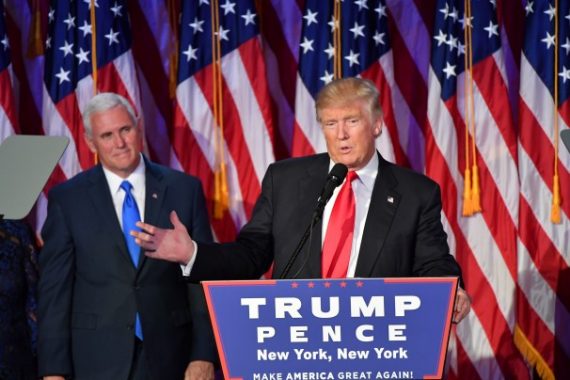

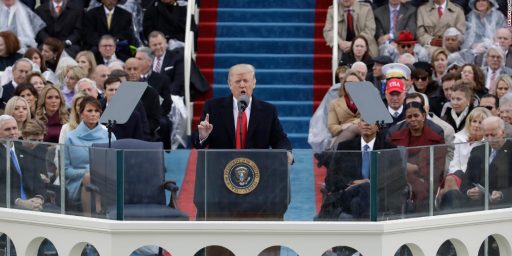
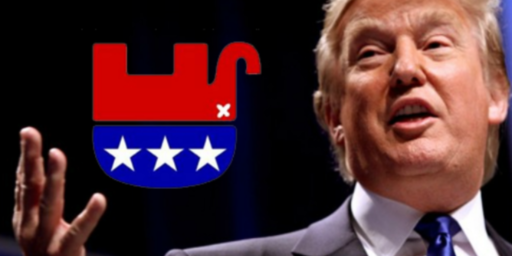
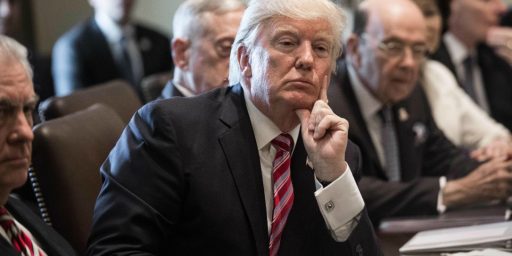
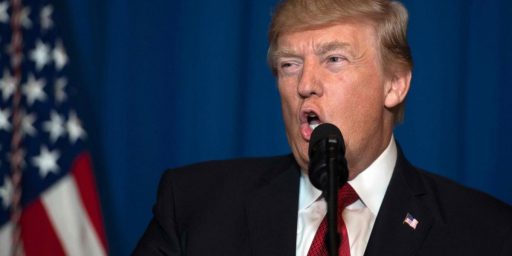
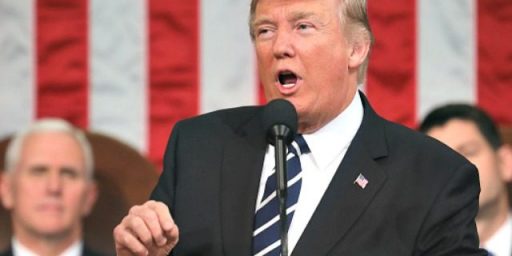
Note that exit polls suggest Johnson voters were likelier to favor Clinton as a second choice than Trump. In other words, if he had any spoiler effect at all, it was to hurt Clinton more than Trump. I myself was surprised by these results, but I did actually meet a Bernie supporter who claimed he was thinking of voting for Johnson. I was a little flabbergasted that a supporter of a candidate whose campaign was centered around such causes as single-payer health care, free college, and a $15 minimum wage would vote for someone who believed in doing away with much of the country’s social safety net. Part of it may have been some of Johnson’s social and foreign-policy positions (pro-SSM, anti-Iraq War), but I suspect a big part of the reason was simple hatred of Hillary Clinton.
Doug, 3 1/2 years from his next election, this analysis is just bar stool musings. And it’s not going to affect his ability to follow through on his agenda, since he doesn’t have one.
You do have to wonder what would have happened if Johnson hadn’t flaked out so badly as the campaign went on. By the time he gave the interview while sticking out his tongue there was little chance anyone was actively voting for him, rather than for the Libertarian concept or as a protest vote.
You may be aware that I’ve been incessantly pushing the point (sometimes to people’s annoyance) that a lot of the people who say they disapprove of Trump are people who voted for him, and who would vote for him again in a heartbeat: “Yes, Trump is awful, but…” I was making this argument before the election, the idea that we needed to be cautious about interpreting polls that seemed favorable to Hillary when there were a high number of undecided voters who I guessed (correctly, as it turned out) consisted heavily of Republican-leaning voters who were reluctant to support Trump but who probably would in the end.
The failure to take undecided voters into account was, I believe, one of the biggest oversights pundits made when interpreting the polls. If you compare to 2012, while Obama wasn’t always ahead–Romney was in the lead for a period of time after the first debate–he was pretty much consistently near or above 50% in every poll from early October until Election Day. Hillary, on the other hand, even though she was always ahead of Trump she was consistently hovering around the mid-40s. That should have been a danger sign. Even during the fallout from the Access Hollywood fiasco, Hillary wasn’t really gaining in the polls, it was just that Trump was losing support, and in retrospect, what was probably happening was that there were a lot of reluctant Trump supporters who were disgusted but who mostly came back to him in the end.
Therefore, I’m not sure I buy the thesis that it was “the overwhelming relentlessness of Trump’s critics that led many Republicans who were otherwise critical of Trump to come out and vote for him.” I don’t think it was a backlash against Trump critics so much as Trump weathering the news cycle until it shifted its attention to the hated Hillary, which motivated reluctant Trump supporters to come home.
Such a long essay to add to a simple observation that Mr Trump’s support is not correctly estimated by traditional political measurements especially polls. Which makes his political weight and likelihood to win in future very difficult to estimate. As long as we look at this administration as a strictly political phenomenon it will be as great a mystery as the flight of the bumble bee.
I think that what we saw in Nov was an event more properly thought of as a ‘cultural’ rather than a ‘political’ decision. A portion of the U.S. we call the White Working Class and their leadership gave a mighty shrug and tried to undo several decades of rapid social transformation. If actual political policies were the cause of the Trump victory the O’Care Repeal would have proceeded slick as a whistle.
The Trumpster won’t be running unopposed. The Democrats could end up running someone as flawed as Hillary again. And being Democrats, they probably will.
I guess I’m an incurable optimist. I regard it as unlikely Trump will run for re-election. I think he’ll resign when the Mueller investigation bears fruit. That will leave Pence, a dominionist fruitcake, running in ’20 unless he’s successfully primaried. At that point the GOPs will claim Trump was the whole problem, and now that he’s gone, the GOPs are gold. They’ll probably even claim credit for getting rid of him. Then they’ll utilize the lesson Trump taught that you don’t have to dog whistle anymore.
I’ll also toss out that Mr Trump might or might not be politically ‘vulnerable’ but he is amazingly ISOLATED. In traditional political thinking Our Leader committed suicide by attacking his own party’s congressional leadership and various senators. If you look at him as a cultural icon this makes him a brave and lonely voice for the virtuous remnant of Real Americans. His followers don’t judge him on his policies they judge him by the strength he shows in battling their enemies. He might be a terrible president but it doesn’t matter that much.
According to the recent Monmouth poll, 25% of the American public is solidly behind Trump, and will, they say, remain behind him no matter what he says or does. I imagine this includes breaking all of his campaign promises, which were writ on water anyway. As long as he keeps on annoying those whom they regard as their enemies (Democrats, Republicans, the press, academe, entertainment, the arts, publishing, and anyone occupying a social/economic/educational class above theirs), he’s a-okay with them.
It’s possible he could lose his base if he doesn’t do their bidding on immigration. Keeping the country as white as possible seems to be the only issue that really matter to them.
It will be interesting to see what he says, and if he pardons Arpaio. Huckabee Sanders just said that no action wold be taken on that today. My emphasis.
@edmondo:
Even if the Dems end up nominating a flawed candidate, it won’t automatically spell doom for them. If Hillary had won the Democratic nomination back in 2008, it’s very, very likely she would have won the presidency. Almost any Democrat would have. (Maybe John Edwards, whose affair was exposed in the late summer of that year, would have blown it.) Moreover, when you’re an incumbent running for reelection, it’s very hard to escape the election being a referendum on your presidency, and much harder to make it about the other candidate. The economy is overdue for a recession (ironically, it stands a greater chance of that if some of his agenda items pass), and there are innumerable crises he has great capacity to bungle, with potentially catastrophic consequences. If everything’s in shambles by 2020, Hillary herself could probably beat him, let alone any other Democrat who comes along.
If, on the other hand, the economy continues to sail along and even improve, AND if the Russia scandal fizzles (i.e. Republicans decide on doing nothing about it), AND if the world isn’t a smoldering ruin from the result of his dick-measuring contest with Kim Jong Un, THEN the default assumption should be that he’d be a favorite for reelection, regardless of who the Dems nominate. The American electorate is more than willing to turn a blind eye to incompetence when they think the country’s in at least ok shape. Bush proved that in 2004.
@Kylopod:
AND if the Russia scandal fizzles …
What scandal? The one where WikiLeaks published the truth of fixing the nomination for the only candidate who could lose to Trump?
@edmondo: While I see the problem as real, I still feel compelled to discount your musings on it since, for you, the “flaw” is the (D) next to the name.
@Kylopod:
Super humongously mega overdue. There haven’t been this many consecutive months of positive growth since they started taking stats. I Ieft my last job after a bungled 3100-mile move, and I’m frantically trying to get one in the next 2 mos before it happens.
doug said:
It’s late and I’m tired but I can’t find this anywhere at your link. Can you spell out explicitly where this is from?
@teve tory:
Thanks, Obama!
Well, to be fair, it was fake when Obama was doing it, and the real unemployment figure was 147%. But now it’s just tremendous, really, really very good.
Here’a the thing: everyone presumes that Trump won the election because he was strong. But what if he wildly underperformed against a fatally flawed candidate ? Onnean , if you were told that candidate fails to unite their party, publicly collapses, has the FBI attack them twice, has their internal campaign comminications leak, and suffers a major gaffe in last two months of campaign, what proportion of vote you would bet their opponent gets? Sure not going to be 46%…
And btw, anyone who says that the DNC or Podesta leaks exposed any fixing of the primary is either dupe or moron.
@panda:
That’s exactly what I’ve been arguing for a long time. Trump had the lowest favorability rating of any nominee in history. But Hillary’s rating was almost as bad, so they just kind of canceled each other out.
Also, most political science projections (which ignore who the candidates are, and focus on such matters as the economy and how long the incumbent party had been in power) suggested that 2016 was either a toss-up or lean-Republican year. Trump tended to do worse than Republican candidates for other offices in the states and districts he won. So yes, the evidence strongly suggests he underperformed.
To repeat what I said the other day: it’s a mistake to interpret his victory purely in terms of his Trumpiness and not in terms of his being a Republican during a year in which Republicans were generally favored.
Obviously the dopes at Breitbart can’t be counted on to undermine Chump!
@Kylopod: Yes. That’s why I’ve asked people to imagine Hillary Clinton beating either Rubio or Kasich. In some sense, Republicans won despite Trump, not because of it.
@Kylopod:
@panda:
Agreed. Still, I do think he has a greater capacity than a conventional candidate for low approval ratings not to doom him. Reagan and Clinton had moments early in their presidencies when their approval ratings sank to the mid-30s. But I don’t think either of them could have won reelection with those ratings; they only were able to do so after their ratings rose. I don’t think that’s at all clear with Trump. I think there are scenarios where he still has fairly dismal ratings in 2020 and still is able to win. In fact, if he does win reelection it probably will be while having relatively low approval ratings. I’m not sure how low his ratings would have to be in order to doom him, but I sense his threshold is lower than that of an ordinary candidate.
It’s not that he’s magic or that the polls are meaningless, it’s that there were a large number of Trump voters who registered a negative opinion of him, and I don’t think it was solely due to Hillary’s unpopularity. After all, if the problem was merely that both candidates were unpopular, why didn’t we see an unpredented move toward third parties? Historically there have been many times when third-party candidates have received far more than the ones last year did. Perot won 19% of the vote in 1992, and while his 1996 total was less than half of that, it was still higher than that of all the 2016 third-party candidates combined. Trump won 90% of the Republican vote, scarcely lower than Romney. The fact is that there are a lot of partisan Republicans who will vote for anyone with an R after their name, even a candidate they dislike. And that causes him to look in worse shape politically than he probably is.
Looking through CNN’s exit polls, I noticed the following pertinent to this discussion.
Of those voters with an unfavorable view of both Clinton and Trump, 47% supported Trump, while only 30% supported Clinton.
Of those voters who said Clinton does not “have the temperament” to be president, only 5% voted for her. However, among those who said the same about Trump, 19% voted for him.
Oh, and one final tidbit:
Of those who said the next president should “be more liberal” than Obama, 23% voted for Trump.
Ok, that’s it. Voters are morons. I’m throwing in the towel.
@Kylopod:
I know a few who fit this profile. They were all involved in tech in some way, mostly coders. I’ll be honest, I think there was a fair amount of misogyny involved–that, and the fact that they are barely interested in politics, so it isn’t as much of a giant leap for them to go from Bernie to Johnson.
The 2016 election was Lake Wobegon in reverse: all the choices were less than desirable, so naturally, the worst choice won. As the GOP tried to spit (posthumously) on FDR’s grave for half a century, the strongest voting bloc in 2016 was those who wanted to spit in Obama’s face. They failed twice, but their hour came round at last.
@Kylopod:
I wrote a short piece a few weeks ago about how we shouldn’t worry that voters are morons because democracy works in spite of the voters always being morons.
A lot will happen between now and 2020. In a couple of months we may see a stock market divecwhen we fail to pass a budget. In a year we may very well be in a recession.
Trump has already lost essentially all of the support he could possibly lose. The important question is not whether he could go lower — it’s whether there’s anything he could do to get back those people who voted for him but are now unhappy with him.
I honestly have no idea, because it sure seems that anyone gullible enough to have voted for him once is gullible enough to be fooled again.
@MarkedMan: Actually what hurt Johnson the most is our first-past-the-post, winner takes all, electoral system which leads to the “wasted vote” syndrome. The vote for all third part candidates is lower than their last polling numbers because ultimately people feel they have to vote for someone they think can win. If we switch to Ranked Choice Voting where the votes for a candidate who is eliminated for coming in last in any round are transferred to the voter’s next choice, that whole problem goes away. That might not get third pat candidates elected, at least at first, but it would provide a much better idea of the real support for their positions.@SC_Birdflyte:
@teve tory:
I would like to see that piece in case I missed it, but I’m not disagreeing–I wasn’t going full Mencken here.
I do believe, however, that in many ways our system is broken. Last year I was constantly hearing about how Trump was going to lose in a “Goldwater-level landslide.” That was never remotely plausible. While Trump’s victory was hardly inevitable, the race was always going to be competitive, and people who didn’t realize that proved they don’t understand the American system as it functions today. It wasn’t competitive because of Hillary’s flaws. The Dems could have run anyone–Bernie, Joe Biden, Obama, Zombie FDR–and something close to 45% of voters at minimum would have supported Trump no matter what.
By contrast, the Donald Trump of France, Marine Le Pen, was actually defeated in a Goldwater-level landslide. That isn’t because French voters are necessarily more discerning or less racist than Americans. Indeed, all the evidence suggests Islamophobia and anti-Semitism are more widespread there than here. And Le Pen does not have anything close to Trump’s utter incompetence or temperamental flaws. She’s a smart racist, which in some ways is even scarier than Trump. But France simply doesn’t have a system in which everything’s a zero-sum game between two parties vying for power. It doesn’t have a Fox News ready to brainwash large chunks of the populace into voting for anyone with an R after their name, and into thinking of the other candidate as the anti-Christ.
The rise of Trump was, at bottom, a failure of American institutions. It was a direct result of a rigid two-party system in which one of the parties has gone completely off the deep end, embracing unreality beyond that of any other major party in the developed world. The problem, then, isn’t that American voters are stupid. That’s a given, as you point out. The problem is that we now lack the institutions to prevent that stupidity from having catastrophic consequences.
@Kylopod:
The rise of Trump was, at bottom, a failure of American institutions. It was a direct result of a rigid two-party system in which one of the parties has gone completely off the deep end, embracing unreality beyond that of any other major party in the developed world. The problem, then, isn’t that American voters are stupid. That’s a given, as you point out. The problem is that we now lack the institutions to prevent that stupidity from having catastrophic consequences.
Doublepluslike. I would add that what really keeps me up at night is wondering what we’re looking at, say, over the next 10-20 years.
My hope for a long time was that without anti-communism to hold together the ‘Christian’ cultural traditionalists and the free market disciples, we would get either a more libertarian or more communitarian (ala GK Chesterton) right wing. The nightmare I’ve woken into is one where the right is morphing into some unholy combination of the Democrats of the antebellum South and the Spanish Falange. My read of history is that if we cannot reverse the current trends on the right, then we are in for a rough couple of decades.